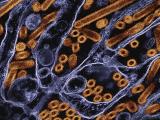Feb 26, 2010
Vietnam reports fatal H5N1 case
Vietnam's health ministry today announced that a 38-year-old woman died from H5N1 avian influenza, marking the country's second case of the year, Agence France-Presse (AFP) reported. She died on Feb 23 in Tien Giang province, in southern Vietnam, after a 2-day hospitalization. The ministry said she had slaughtered and cooked sick waterfowl. Earlier this week Vietnam reported that a 3-year-old girl from Khanh Hoa province in central Vietnam was recovering after being hospitalized with an H5N1 infection. If confirmed by the World Health Organization (WHO), the cases will raise Vietnam's H5N1 count to 114 cases with 58 deaths. The country has had several recent poultry outbreaks.
New antiviral effective against H5N1 in animal study
Researchers testing a new neuraminidase inhibitor for prevention and treatment of H5N1 influenza infection reported promising findings in a mouse study today, suggesting that the new antiviral may be effective even against oseltamivir (Tamiflu)-resistant strains. The international study group, headed by Dr Yoshihiro Kawaoka, is based at the University of Wisconsin in Madison, and their findings appear in Public Library of Science (PLoS) Pathogens. Previous animal studies of the neuraminidase inhibitor R-125489 and its prodrug CS-8958 have shown that the drug is effective against seasonal flu. In the new study, the group found that mice that were given a single intranasal dose of CS-8958 2 hours after experimental H5N1 infection had higher survival rates and lower virus levels than those given a standard 5-day course of oseltamivir. Also, mice that were given a single dose 7 days before infection with the virus were protected. The researchers also found that R-125489 bound more tightly to neuraminidase than any of the other drugs they tested.
Feb 25 PLoS Pathogens press release
Feb 26 PLoS Pathogens report
Single-dose, adjuvanted H5N1 vaccine called promising
Hungarian and British researchers, writing in the February Journal of Virology, report that a single-dose, adjuvanted H5N1 influenza vaccine generated a good immune response in adult and elderly volunteers. In the trial, 480 people were randomly assigned to receive one or two 3.5-microgram (mcg) doses of the vaccine or one dose of 6 or 12 mcg. Single doses of 6 mcg or more triggered antibody responses that met European Union and US licensing criteria for flu vaccines, the report says. No unexpected adverse events were reported. "We found that the present vaccine is safe and immunogenic in healthy adult and elderly volunteers and requires low doses and, unlike any other H5N1 vaccines, only one injection to trigger immune responses which comply with licensing criteria," the report states. The vaccine, made by Omninvest of Hungary, contains an aluminum phosphate adjuvant.
February Journal of Virology abstract
FDA approves 13-valent pneumococcal vaccine
The US Food and Drug Administration (FDA) this week approved Prevnar 13, a pneumococcal vaccine that protects against 13 serotypes of Streptococcus pneumoniae, which causes pneumonia and infections of the blood, middle ear, and meninges. The vaccine, approved for children from 6 weeks to 5 years old, succeeds Prevnar, which was approved in 2000 and covers seven S pneumoniae serotypes. The FDA said the use of Prevnar reduced the rate of disease caused by the seven serotypes by 99% by 2007, and the six additional serotypes covered by Prevnar 13 account for 62% of the remaining invasive pneumococcal disease burden in young children. Prevnar 13 is administered in a four-dose schedule at 2, 4, 6, and 12-15 months of age. The Centers for Disease Control and Prevention's Advisory Committee on Immunization Practices (ACIP), meeting Feb 24, recommended Prevnar 13 for healthy children aged 2 through 59 months, Pfizer Inc. announced. The vaccine is made by Wyeth Pharmaceuticals, a unit of Pfizer.
Feb 24 FDA announcement



















